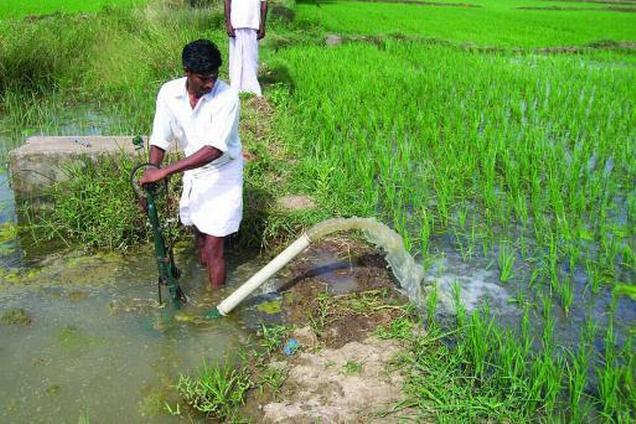 The India SW monsoon
thus far has demonstrated climate change does not affect systems uniformly. This
fact presents a unique risk management challenge. The easterly extrusion
of the monsoon's normal eastern front, weak cyclonic (and at times anti-cyclonic)
winds, regionally varied rainfall that is net negative 50%+1
is compounded by poor infrastructure that is not able to cope even under the
best of conditions. (500MW deficit power for pumps2;
failure to recharge bore-wells; over-exploited water table; poor
management of reservoirs, dams and allocation.)
The India SW monsoon
thus far has demonstrated climate change does not affect systems uniformly. This
fact presents a unique risk management challenge. The easterly extrusion
of the monsoon's normal eastern front, weak cyclonic (and at times anti-cyclonic)
winds, regionally varied rainfall that is net negative 50%+1
is compounded by poor infrastructure that is not able to cope even under the
best of conditions. (500MW deficit power for pumps2;
failure to recharge bore-wells; over-exploited water table; poor
management of reservoirs, dams and allocation.)Even a cursory review of the effect of an irregular India monsoon, its effect on the Himalayan climatic cycle and stability, supports that systemic feedback loops are breaking down at alarming rates.
 The breadbasket of India,
the Cauvery Delta, requires that 400,000 acres of paddy be irrigated.
This is an increase of 25% from last year. The remaining hundreds of
thousands of acres (about one third of all acres under paddy) rely
completely on traditional rain fed irrigation.
The breadbasket of India,
the Cauvery Delta, requires that 400,000 acres of paddy be irrigated.
This is an increase of 25% from last year. The remaining hundreds of
thousands of acres (about one third of all acres under paddy) rely
completely on traditional rain fed irrigation.
In addition to this literal climate crisis, heat is rising on the alawys politically charged cross state border release of dam reservoirs to satisfy dependent downstream farmers of the delta. The current reservoir readings do no foster confidence that both state's farmers will get their required quantum.3 Coupled with a weak rupee that has resulted in a near doubling of cost of chemical fertilizers (75% imported4) and this year is beginning to show signs of being the sum-of-all-fears.
 PGI's perspective is that
the monsoon remains viewed from polar positions – by those who
mistakenly believe they are disconnected and view the monsoon as
romantic or nostalgic; and those lower/bottom pyramid communities who
rely on it for their annual revenue requirement just to subsist. The
collision course can be avoided through cross sectional / cross
cutting approaches to raising political and public awareness and
action.
PGI's perspective is that
the monsoon remains viewed from polar positions – by those who
mistakenly believe they are disconnected and view the monsoon as
romantic or nostalgic; and those lower/bottom pyramid communities who
rely on it for their annual revenue requirement just to subsist. The
collision course can be avoided through cross sectional / cross
cutting approaches to raising political and public awareness and
action.
Drastic water
conservation measures, emergency energy packages and CoOp
organization of rural development interests must be deployed
immediately otherwise a major climate crisis on the one hand; and
a water resource management crisis on the other, is about to reach flashpoint.
The shocks could have extreme consequences due to the sheer scale of
population and lack of politico-social safety net. It's the 'resilience' building that UNEP, PGI and others have been advocating -urging developing countries to address. But still the entire national and international focus on 'the India economy' focuses on GDP, forex and market closing numbers, with a blissful unawareness of the connection.
Even for our U.S. readership, the event here are no far away concern. Even a cursory review of the effect of an irregular India monsoon, its effect on the Himalayan climatic cycle and stability, supports that systemic feedback loops are breaking down at alarming rates. We give thanks with our brother and sister colleagues in the NE India that the rains have been favorable - but even they- seem more concerned about the problems reported herein and the systemic approach that must be adopted. There are no regional crisis when it comes to climate change and shocks. We are seeing symptoms of a systemic illness. The time for a global land ethic is upon us that re-orients the roles of public - private, government and intergovernment resources toward a common service and repair of the natural feedback loops key to Earth -and our- survival.
Our energies and prayers are with all those gathering in Rio that a strong and committed plan of action be framed and implemented. PGI will be issuing press releases on Twitter from our representative to the UNGC Corp Sustainability Forum. Stay tuned.
1IMD
June 15, 2012
2Tamil
Nadu Farm Association
3Federation
of Farmers in Cauvery Delta Districts, June 14, 2012
4Times
India, June 13, 2012 Complex fertilizers increase 55%; reduced
subsidy for non-urea fertilizer
Fair Use Notice: This post contains copyrighted material that has not been authorized by the copyright owners. PGI believes this educational use on the Green Eye Web-blog constitutes a fair use of the copyrighted material (as provided for in section 107 of the US Copyright Law.) If you wish to use this copyrighted material for purposes that go beyond fair use, you must obtain permission from the copyright owner. Fair Use notwithstanding we will immediately comply with any copyright owner who wants their material removed or modified or wants us to link to their web site which we routinely do as a business practice notwithstanding.

No comments:
Post a Comment